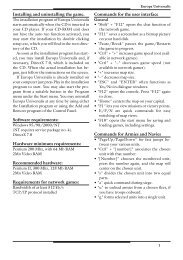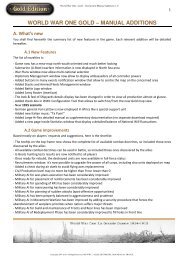You also want an ePaper? Increase the reach of your titles
YUMPU automatically turns print PDFs into web optimized ePapers that Google loves.
End of Senussi Uprising<br />
Description: This event will remove the negative effects brought in play by<br />
the Sanussi Uprising.<br />
Historical notes: The Senussi uprising ended, when all their troops were<br />
ordered to withdraw from Egypt in March 1917. The Senussi were<br />
severely beaten by the superior British forces several times and since the<br />
Egyptian population did not join the jihad, the Ottoman's hopes to occupy<br />
the Suez-Canal were lost.<br />
Conditions: the event [stratagem] “Senussi Uprising” has been occurred,<br />
and the event [stratagem] “Wassmuss” is not in play or it has been played<br />
with option #1 or #2 (not option #3).<br />
Difficulty: die roll 5+.<br />
Modifiers: -1 if Wassmuss is leading the Senussi Uprising (“Wassmuss”<br />
event played and option #3 has been chosen).<br />
Enter in play: Events phase, any turn.<br />
Option #1: (historical choice) Senussi uprisings quelled – Uprisings in Libya<br />
calmed. Italy may free the garrisoning Corps eventually located in rebel<br />
areas.<br />
Notes: once successfully in play, the event is discarded and cannot occur<br />
again.<br />
Clemenceau loses office (Historical Variant)<br />
Description: This event will remove all benefits coming from Clemenceau<br />
ministry in France.<br />
Historical notes: When Clemenceau became Prime Minister in 1917<br />
victory seemed to be a long way off and the government had to combat<br />
increasing resentment against the war in France. Air raids were causing<br />
huge physical damage to Paris as well as damaging the morale of its<br />
citizens and the scarcity of resources led to an increasing number of<br />
demonstrations. In March, 1918 the Western Allies were caught off guard<br />
by the German spring offensive and as the German line continued to<br />
advance the fall of Paris could not be ruled out. Although Clemenceau was<br />
respected for his strong leadership, it was believed that if he stayed in<br />
power France would be lost and that a government headed by Briand<br />
would be beneficial because he would make peace with Germany on<br />
advantageous terms. After several secret sessions of the Chamber of<br />
Deputies and the Senate, Clemenceau’s hold on the premiership became<br />
increasingly shaky and led to his resignation on April 9th.<br />
Conditions: the event [stratagem] “Clemenceau” has successfully occurred.<br />
Difficulty: die roll 5+.<br />
Modifiers: +2 if Paris is under German control.<br />
Enter in play: Events phase, any turn.<br />
180 World War One: La Grande Guerre 1914-1918<br />
Option #1: (historical choice) Clemenceau loses office – Clemenceau is no<br />
longer Président du Conseil. France loses all benefits coming from him<br />
being in office!<br />
Notes: once successfully in play, the event is discarded and cannot occur<br />
again.<br />
27.5 Stratagems<br />
Here all events are grouped into Battle, Diplomatic, Economic, Military,<br />
Political, Spy and Technological stratagems.<br />
Battle Stratagems<br />
Surprise<br />
Description: This event will give you an outstanding bonus in the battle<br />
(both naval or land). If the current battle is a naval encounter, the side<br />
playing this event receives a +1 die roll bonus to the Naval Surprise test<br />
(beware that this modifier can be modded). If it’s instead a land battle, the<br />
following bonuses are going to be applied. In Movement War, if the side<br />
playing this event is the defender, he inflicts a -3 malus to the attackers<br />
combat die rolls (beware that this modifier can be modded); this malus<br />
decreases by one point during each combat round, so becoming 0. On the<br />
other hand, the attacker has no benefit if playing this event in Movement<br />
War. In Trench War, instead, both attacker and defender may benefit of the<br />
above mentioned bonus/malus (for the attacker is a bonus to the die roll,<br />
for the defender is a malus to the enemy’s die rolls). In addition, if played<br />
by the attacker, the defender may not bring any reinforcements during the<br />
first two combat rounds (exactly during the Flash Bombardments, but<br />
beware this bonus can be disabled by modding) and the attacker benefits<br />
of a +1 die roll bonus on the Flash Bombardments die rolls (also this one<br />
is moddable). If played by the defender, instead, the attacker suffers from<br />
a -1 malus to the Preliminary Bombardments die rolls (also this one is<br />
moddable), whichever is the type of selected Preliminary Bombardment.<br />
Finally, last but not least, the nation playing this event will benefit from a +2<br />
bonus die roll modifier for all large river crossing tests (beware that this<br />
modifier can be modded)!<br />
Historical notes: “Surprise becomes effective when we suddenly face the<br />
enemy at one point with far more troops than he expected. This type of<br />
numerical superiority is quite distinct from numerical superiority in general:<br />
it is the most powerful medium in the art of war”. Carl von Clausewitz (“On<br />
War”, 1832, Book 6, Chapter 2)<br />
Conditions: automatic.<br />
Difficulty: die roll 3+.
















